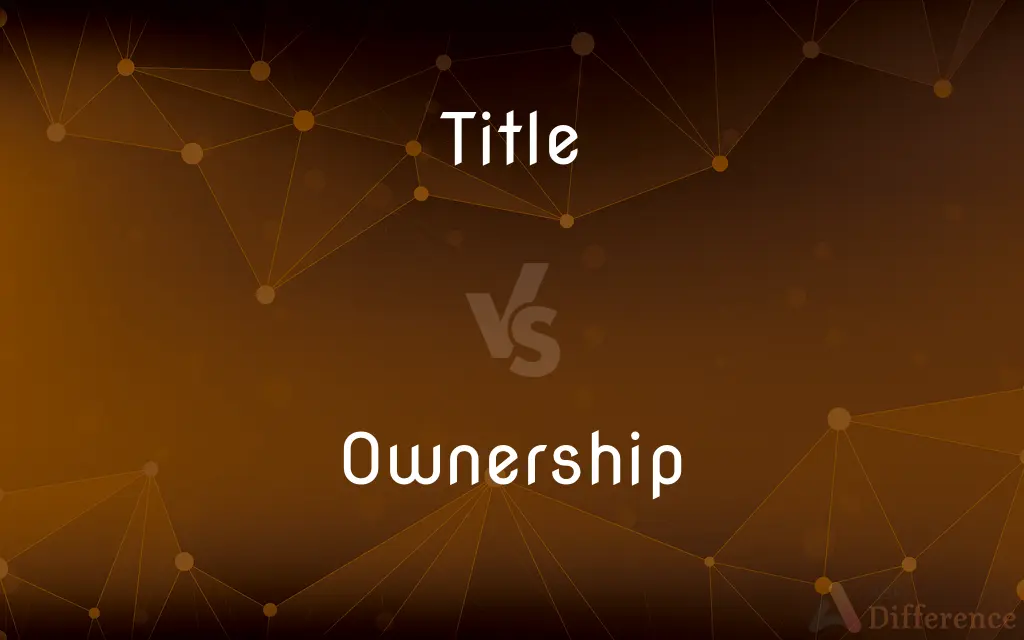Title vs. Ownership — What's the Difference?
By Fiza Rafique & Maham Liaqat — Updated on March 27, 2024
Title refers to the legal right to possess property, while ownership is the actual possession and control of that property.

Difference Between Title and Ownership
Table of Contents
ADVERTISEMENT
Key Differences
Title and ownership, though closely related in the context of property and assets, differ in their legal and practical implications. Title represents the legal right to own property, evidenced by documents like deeds or titles, which formally recognize an individual's or entity's legal claim. Ownership, on the other hand, implies actual possession or control over the property. This distinction is crucial in understanding how property rights are held, transferred, and recognized in legal contexts.
The concept of title is particularly important in legal disputes or transactions, as it provides documented evidence of a person's right to property. For instance, holding the title to a piece of land means that the individual has the legal backing to claim ownership, even if they do not currently occupy the land. In contrast, ownership without title can lead to complications, as possessing or using property doesn't necessarily grant legal rights to it. This scenario often arises in cases of inheritance or when property is acquired without formal documentation.
In many legal systems, transferring title is a critical step in the transfer of ownership, ensuring that the new owner not only possesses the property but also has the legal right to it. The process usually requires formal documentation and, in some cases, registration with relevant authorities. While ownership can sometimes be assumed or implied through the actual use or possession of property, title cannot be assumed and must be formally granted and recorded.
Title also plays a key role in the ability to use property as collateral for loans or to transfer ownership to others. Without a clear title, an owner may face restrictions on their ability to leverage property for financial gain or to sell it. This illustrates the practical importance of title beyond the mere legal claim, impacting the financial and transactional capabilities associated with the property.
Understanding the difference between title and ownership is essential for navigating legal, financial, and real estate matters, highlighting the importance of both concepts in establishing and recognizing property rights. While ownership denotes control and possession, title secures and formalizes these rights, ensuring they are recognized and protected under the law.
ADVERTISEMENT
Comparison Chart
Definition
Legal right to own property
Actual possession and control of property
Evidence
Documented (e.g., deed, title documents)
Can be actual or implied by possession
Legal Importance
Essential for formal recognition of property rights
Indicates actual use and control, but not necessarily legal rights
Transfer
Requires formal documentation and process
Can occur through physical possession or use
Role in Transactions
Critical for legal transactions and disputes
Indicates practical control but may lack formal recognition
Compare with Definitions
Title
Represents formal legal recognition of property ownership.
The car's title was transferred to the new owner after the sale.
Ownership
Involves actual control and use of property.
Their ownership of the apartment allowed them to renovate it.
Title
Documented evidence of ownership rights.
She presented the property title as proof of her ownership.
Ownership
Implies responsibility and maintenance.
Ownership of the antique car required significant upkeep.
Title
Necessary for certain legal actions and transactions.
Without a clear title, he couldn't use the land as collateral.
Ownership
Does not necessarily require formal documentation.
His ownership of the artwork was known, though not formally documented.
Title
Can exist independently of physical possession.
Despite living abroad, her title to the house remained undisputed.
Ownership
Can be demonstrated through physical possession.
By living in the house, they showed ownership, despite the title issues.
Title
Subject to public record and registration.
The title to the property is registered with the county office.
Ownership
Affects day-to-day management and decision-making.
As the owner, she decided the business's strategic direction.
Title
A title is one or more words used before or after a person's name, in certain contexts. It may signify either generation, an official position, or a professional or academic qualification.
Ownership
Ownership is the state or fact of exclusive rights and control over property, which may be any asset, including an object, land or real estate, intellectual property, or until the nineteenth century, human beings. Ownership involves multiple rights, collectively referred to as title, which may be separated and held by different parties.
Title
The name of a book, composition, or other artistic work
The author and title of the book
Ownership
The act, state, or right of possessing something
The ownership of land
The rise in car ownership
Title
A name that describes someone's position or job
Leese assumed the title of director general
Ownership
The state or fact of being an owner.
Title
The position of being the champion of a major sports competition
Davis won the world title for the first time in 1981
Ownership
A group that owns something
The ownership of the team wants to make a trade for a better pitcher.
Title
A right or claim to the ownership of property or to a rank or throne
The buyer acquires a good title to the goods
A grocery family had title to the property
Ownership
The state of having complete legal control of something; possession; proprietorship.
Title
(in church use) a fixed sphere of work and source of income as a condition for ordination.
Ownership
(business) Responsibility for something.
The successful candidate will take ownership of all internal design projects.
Title
Give a name to (a book, composition, or other work)
A report titled The Lost Land
Ownership
The state of being an owner; the right to own; exclusive right of possession; legal or just claim or title; proprietorship.
Title
An identifying name given to a book, play, film, musical composition, or other work.
Ownership
The relation of an owner to the thing possessed; possession with the right to transfer possession to others
Title
A general or descriptive heading, as of a book chapter.
Ownership
The act of having and controlling property
Title
A written work that is published or about to be published
The titles in the publisher's fall catalog.
Ownership
The state or fact of being an owner
Title
A division of a legal code, generally consisting of multiple related statutes.
Title
Often titles Written material to be read by viewers that is included in a film or television show, typically presenting credits, narration, or dialogue.
Title
A written piece of translated dialogue superimposed at the bottom of the frame during a film; a subtitle.
Title
A formal appellation attached to the name of a person as a sign of office, rank, profession, or hereditary privilege.
Title
A descriptive name; an epithet
The dubious title of the worst bowler in the league.
Title
A right or claim, or the basis of a right or claim
"The weight of a fish is commonly its only title to fame" (Henry David Thoreau).
Title
A form of ownership free of valid claims by other parties.
Title
The aggregate evidence that gives rise to a legal right of possession or control.
Title
The instrument, such as a deed, that constitutes this evidence.
Title
Sports & Games A championship
Which boxer won the heavyweight title?.
Title
A source of income or area of work required of a candidate for ordination in the Church of England.
Title
A Roman Catholic church in or near Rome having a cardinal for its nominal head.
Title
To give a name or title to.
Title
An appellation given to a person or family to signify either veneration, official position, social rank, the possession of assets or properties, or a professional or academic qualification. See also :Category:Titles
Title
(property law) Legal right to ownership of a property; a deed or other certificate proving this.
A good title to an estate, or an imperfect title
Title
In canon law, that by which a beneficiary holds a benefice.
Title
A church to which a priest was ordained, and where he was to reside.
Title
The name of a book, film, musical piece, painting, or other work of art.
I know the singer's name, but not the title of the song.
Title
A publication.
The retailer carries thousands of titles.
Buyers of the new video game console can choose from three bundled titles.
Title
A section or division of a subject, as of a law or a book.
Title
A written title, credit, or caption shown with a film, video, or performance.
The titles scrolled by too quickly to read.
Title
(bookbinding) The panel for the name, between the bands of the back of a book.
Title
The subject of a writing; a short phrase that summarizes the entire topic.
Title
A division of an act of law
Title II of the USA PATRIOT Act
Title
(sports) The recognition given to the winner of a championship in sports.
Title
A long title.
Title
A short title.
Title
(transitive) To assign a title to; to entitle.
Title
An inscription put over or upon anything as a name by which it is known.
Title
The inscription in the beginning of a book, usually containing the subject of the work, the author's and publisher's names, the date, etc.
Title
The panel for the name, between the bands of the back of a book.
Title
A section or division of a subject, as of a law, a book, specif. (Roman & Canon Laws), a chapter or division of a law book.
Title
An appellation of dignity, distinction, or preëminence (hereditary or acquired), given to persons, as duke marquis, honorable, esquire, etc.
With his former title greet Macbeth.
Title
A name; an appellation; a designation.
Title
That which constitutes a just cause of exclusive possession; that which is the foundation of ownership of property, real or personal; a right; as, a good title to an estate, or an imperfect title.
Title
A church to which a priest was ordained, and where he was to reside.
Title
To call by a title; to name; to entitle.
Hadrian, having quieted the island, took it for honor to be titled on his coin, "The Restorer of Britain."
Title
A heading that names a statute or legislative bill; may give a brief summary of the matters it deals with;
Title 8 provided federal help for schools
Title
The name of a work of art or literary composition etc.;
He looked for books with the word `jazz' in the title
He refused to give titles to his paintings
I can never remember movie titles
Title
A general or descriptive heading for a section of a written work;
The novel had chapter titles
Title
The status of being a champion;
He held the title for two years
Title
A legal document signed and sealed and delivered to effect a transfer of property and to show the legal right to possess it;
He signed the deed
He kept the title to his car in the glove compartment
Title
An identifying appellation signifying status or function: e.g. Mr. or General;
The professor didn't like his friends to use his formal title
Title
An established or recognized right;
A strong legal claim to the property
He had no documents confirming his title to his father's estate
He staked his claim
Title
(usually plural) written material introduced into a movie or TV show to give credits or represent dialogue or explain an action;
The titles go by faster than I can read
Title
An appellation signifying nobility;
`your majesty' is the appropriate title to use in addressing a king
Title
An informal right to something;
His claim on her attentions
His title to fame
Title
Give a title to
Title
Designate by an identifying term;
They styled their nation `The Confederate States'
Common Curiosities
How is title transferred?
Title transfer requires formal documentation, such as a deed for real estate, and often registration with governmental authorities.
Why is title important in property transactions?
Title provides legal proof of ownership rights, essential for validating transactions, resolving disputes, and using property as collateral.
What is the difference between title and ownership?
Title is the legal right to property, documented and recognized by law, while ownership is the actual control and possession of that property.
What role does possession play in ownership?
Possession implies actual control and use, which can be an aspect of ownership but without formal documentation, may not provide legal protection.
Is a title necessary for all types of property?
Most significant properties (real estate, vehicles) require a title for legal ownership, though smaller or less formal items may not.
What does having a clear title mean?
A clear title means the property is free from liens, disputes, or other encumbrances, ensuring legal freedom to transfer ownership.
Can you have ownership without title?
Yes, it's possible to possess and control property without holding the title, though this may limit legal recognition and rights.
Can title and ownership be separated?
Yes, in some situations, one party may hold the title (legal ownership) while another has actual possession and control (physical ownership).
Does title guarantee ownership?
While title is a strong legal claim to ownership, disputes or claims (e.g., liens, encumbrances) can complicate actual ownership rights.
What happens if there are discrepancies between title and ownership?
Discrepancies can lead to legal disputes, requiring court intervention to determine rightful ownership and possibly correct the title.
What is a title search?
A title search is a process to review public records to verify the legal owner of property and identify any claims or liens against it.
How can ownership without title be resolved?
Resolving ownership without title often involves legal actions like filing for a declaratory judgment or undergoing a quiet title action to formally establish ownership rights.
Can ownership be transferred without changing the title?
While physical control can be transferred, without updating the title, the legal recognition of ownership does not change.
How do liens affect ownership and title?
Liens are claims against a property that must be cleared for a clean title, affecting the owner's ability to sell or mortgage the property.
Why might someone have title but not possession?
This can occur in cases like inheritance disputes, leasing arrangements, or when the property is illegally occupied by another.
Share Your Discovery

Previous Comparison
Nominator vs. Nominee
Next Comparison
Precisely vs. AccuratelyAuthor Spotlight
Written by
Fiza RafiqueFiza Rafique is a skilled content writer at AskDifference.com, where she meticulously refines and enhances written pieces. Drawing from her vast editorial expertise, Fiza ensures clarity, accuracy, and precision in every article. Passionate about language, she continually seeks to elevate the quality of content for readers worldwide.
Co-written by
Maham Liaqat















































